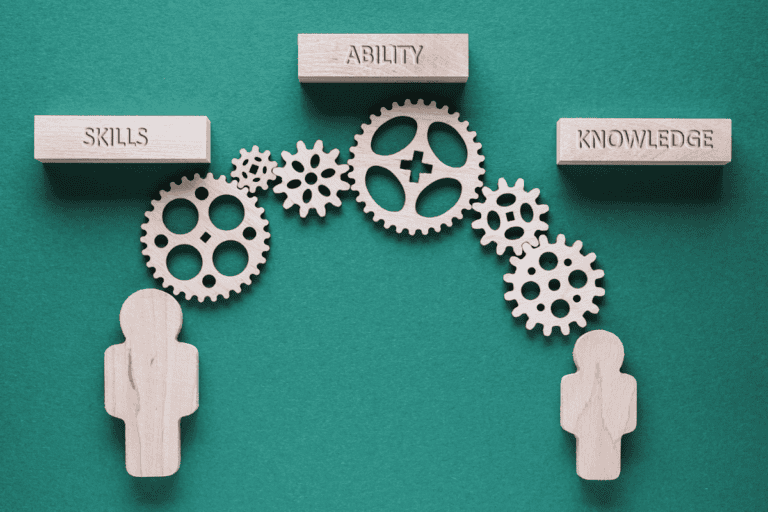What is Relationship Building Strategy?
Did you know that businesses with strong customer relationships experienced a 49% higher revenue growth compared to those that neglected relationship building? Building meaningful connections with customers and stakeholders is no longer just a buzzword; it’s a crucial strategy for achieving long-term success in business.
Whether you’re a small business owner, a sales professional, or a marketing executive, understanding the importance of relationship building and implementing the right strategies can make all the difference in your bottom line.
Key Takeaways:
- Strong customer relationships lead to a 49% higher revenue growth for businesses.
- Relationship building is a crucial strategy for long-term success.
- It is essential for small businesses, sales professionals, and marketing executives to prioritize relationship building.
Understanding the Importance of Relationship Building
When it comes to achieving success in business, building strong relationships with your clients, partners, and colleagues is nothing short of essential. The importance of relationship building cannot be overstated, as it forms the foundation for long-term partnerships and sustained growth.
Strong relationships create a sense of trust and collaboration, allowing businesses to thrive in today’s competitive landscape. They foster loyalty and open up new opportunities, paving the way for mutual success.
Investing in relationship building goes beyond short-term gains and immediate results. It is a strategic approach that prioritizes the long-term benefits of durable connections. By nurturing genuine and meaningful relationships, businesses can establish a solid reputation, enhance brand value, and stand out among competitors.
The Impact of Strong Relationships
Building strong relationships has a profound impact on various aspects of business:
- Long-term partnerships: Strong relationships are the bedrock for establishing long-term partnerships with clients, suppliers, and stakeholders. These partnerships foster collaboration, reliability, and loyalty, providing a stable foundation for sustained growth.
- Trust and credibility: Trust is the backbone of any successful business relationship. When clients and partners trust your business, they are more likely to seek your expertise, rely on your recommendations, and engage in long-term commitments.
- Collaboration and innovation: Building relationships encourages collaboration and fosters an environment where collective knowledge and expertise can thrive. It promotes open communication, sharing of ideas, and the development of innovative solutions.
- Customer retention and satisfaction: Strong relationships with customers lead to improved customer satisfaction, loyalty, and increased chances of repeat business. Satisfied customers are not only more likely to return but also more likely to recommend your products or services to others.
Strong relationships are like a solid foundation – they provide stability, trust, and a platform for growth. Without a strong foundation, a business is at risk of instability and failure.
It is through relationship building that businesses can create an environment where everyone involved feels valued, supported, and confident in the collective pursuit of success.
Developing Relationship Building Skills
Effective relationship building relies on a set of essential skills that can be developed and honed over time:
- Interpersonal skills: Good interpersonal skills enable individuals to connect with others, build rapport, and create a comfortable environment for communication and collaboration.
- Emotional intelligence: Emotional intelligence allows individuals to understand and manage their own emotions as well as the emotions of others. It helps in navigating complex relationships and resolving conflicts amicably.
- Adaptability: Being adaptable and open to change is crucial for relationship building. It involves recognizing and appreciating diversity, embracing different perspectives, and adjusting communication styles accordingly.
- Networking abilities: Developing strong networking abilities helps individuals expand their professional circles, form connections, and stay informed about industry trends and opportunities.
Incorporating these skills into your relationship building efforts can significantly enhance your interactions and deepen the bonds you create in the business world.
Key Techniques for Relationship Building
Building and nurturing relationships is a crucial aspect of successful business growth. By implementing effective relationship building techniques, you can foster connections, foster trust, and create long-lasting partnerships. In this section, we will explore some key techniques that can help you establish and maintain strong relationships.
1. Effective Communication:
Open and honest communication is the foundation of any strong relationship. By actively listening to others, providing clear and concise information, and fostering a safe and respectful environment, you can build trust and understanding. Effective communication allows you to convey your thoughts, opinions, and expectations, while also demonstrating empathy and cultivating a supportive atmosphere.
2. Active Listening:
Active listening involves giving your full attention to the person speaking, without interrupting or formulating a response. By truly hearing and understanding the other person’s thoughts, concerns, and needs, you can show that you value their input and are committed to building a meaningful connection. Be attentive, ask clarifying questions, and reflect on what is being said to deepen your understanding.
3. Empathy:
Empathy is the ability to understand and share the feelings of others. By putting yourself in someone else’s shoes, you can gain a deeper understanding of their experiences, motivations, and challenges. Expressing empathy shows that you genuinely care and are invested in the well-being of the other person, strengthening the bond and laying the foundation for a strong relationship.
4. Building Rapport:
Building rapport involves finding common ground and establishing a connection based on shared interests, values, or experiences. Look for opportunities to connect on a personal level, whether through common hobbies, industry events, or casual conversations. Building rapport creates a sense of familiarity and camaraderie, making it easier to forge a strong relationship based on mutual trust and respect.
5. Offering Support:
A strong relationship is built on mutual support and collaboration. Offer assistance and help others overcome challenges without expecting anything in return. By being a valuable resource and providing support when needed, you demonstrate your commitment to the relationship and create a positive and supportive environment.
“The way to develop a strong relationship is through mutual trust, open communication, and genuine care.” – Richard Branson
By implementing these relationship building techniques, you can establish and nurture meaningful connections that will benefit both you and your business. Building strong relationships is an ongoing process that requires dedication, patience, and genuine effort. Remember, the value of a strong relationship extends beyond just business transactions and can lead to long-term success and personal fulfillment.
Benefits of Relationship Building
Building strong relationships in business can yield a multitude of benefits. When you invest time and effort into developing connections, the rewards can be transformative for your organization. From increased customer loyalty to access to new opportunities, here are some of the key benefits of relationship building:
- Increased Customer Loyalty: By fostering strong relationships with your customers, you can create a loyal customer base that is more likely to continue doing business with you. Trust and rapport built over time can result in repeat purchases and long-term partnerships.
- Brand Advocacy: When you establish authentic relationships with your customers, they become your brand advocates. Satisfied customers are more inclined to recommend your products or services to their network, leading to organic word-of-mouth marketing and positive brand reputation.
- Repeat Business: Building relationships can also lead to repeat business. When you have a solid connection with your customers, they are more likely to choose your offerings over competitors. This can drive consistent revenue and contribute to the growth of your business.
- Access to New Opportunities: Strong relationships can open doors to new opportunities. Collaborations, partnerships, and referrals often arise from trusted connections within your network. These opportunities can enhance your business prospects and expand your reach.
Investing in relationship building is like planting seeds for future growth. By prioritizing connections and nurturing them over time, you create a solid foundation for success in the long run.
In addition to these benefits, relationship building can also lead to enhanced communication, improved problem-solving, and a deeper understanding of your customers’ needs. Now that you understand the advantages, let’s explore how to develop the necessary skills for effective relationship building.
Developing Relationship Building Skills
Developing Relationship Building Skills
Successful relationship building requires a combination of essential skills to establish and nurture connections with others. These skills lay the foundation for building trust, fostering collaboration, and maintaining meaningful relationships. In this section, we will explore the key skills that contribute to effective relationship building.
Interpersonal Skills
Interpersonal skills, such as active listening, effective communication, and empathy, are fundamental for building strong relationships. The ability to understand and relate to others’ perspectives and emotions helps establish rapport and trust. By actively engaging in conversations, showing genuine interest, and demonstrating empathy, you can deepen connections and foster mutual understanding.
Emotional Intelligence
Emotional intelligence plays a crucial role in relationship building. It involves being aware of your own emotions and understanding how they affect your interactions with others. By recognizing and managing emotions effectively, you can navigate challenging situations, handle conflicts, and demonstrate empathy and understanding. Developing emotional intelligence allows you to build strong bonds and establish meaningful connections.
Adaptability
Adaptability is an essential skill when it comes to relationship building. The ability to adapt to different personalities, communication styles, and situations helps foster flexibility and open-mindedness. By being adaptable, you can demonstrate your willingness to accommodate others’ needs, preferences, and opinions, strengthening the foundation of your relationships.
Networking Abilities
Networking skills are crucial in developing and maintaining relationships, both in professional and personal settings. Effective networking involves building connections, cultivating relationships, and leveraging these connections for mutual benefit. By attending industry events, engaging in social activities, and actively seeking opportunities to contribute value, you can expand your network and create a supportive community of individuals invested in your success.
By developing and honing these essential relationship building skills, you can create lasting connections, foster trust, and cultivate mutually beneficial collaborations. Next, we will explore specific strategies for building and nurturing these relationships to ensure their longevity and success.
Strategies for Building Lasting Relationships
Building lasting relationships is essential for success in business. To cultivate strong connections, it is crucial to employ effective strategies that foster trust, loyalty, and mutual benefits.
Maintaining Regular Contact
Consistent communication is key to nurturing relationships over time. Find opportunities to connect with your contacts through phone calls, emails, or scheduled meetings. Regular check-ins demonstrate your commitment and help build rapport.
Offering Value
Showcasing your expertise and providing value to your contacts is a powerful relationship-building tool. Share relevant industry insights, resources, or helpful advice. By offering valuable information, you position yourself as a valuable resource and someone they can rely on.
Showing Appreciation
Expressing gratitude and appreciation for your contacts goes a long way in strengthening relationships. Take the time to acknowledge their contributions, support, or referrals. A simple thank you can leave a lasting impression and foster goodwill.
“Appreciation is a free yet priceless gift that can make a world of difference in any relationship.” – Bob Burg
Practicing Reciprocity
Reciprocity is the foundation of healthy relationships. Look for opportunities to support and assist your contacts, just as they have supported you. Remember to give back, whether through referrals, endorsements, or providing resources. A mutually beneficial relationship creates a strong bond based on reciprocity.
Comparison of Relationship Building Strategies
| Strategy | Benefits |
|---|---|
| Maintaining Regular Contact |
|
| Offering Value |
|
| Showing Appreciation |
|
| Practicing Reciprocity |
|
Implementing these strategies will help you establish and maintain lasting relationships that can lead to valuable partnerships, referrals, and long-term success in business.
Building lasting relationships is crucial for business success. By employing effective strategies such as maintaining regular contact, offering value, showing appreciation, and practicing reciprocity, you can cultivate strong, mutually beneficial connections. Implement these strategies to establish and nurture lasting relationships that drive growth and opportunity for your business.
Implementing Relationship Building in Business
Now that you understand the importance of relationship building in business, it’s time to explore how to implement these strategies effectively. In this section, we will provide you with examples and case studies that demonstrate successful relationship-building initiatives across different industries.
Case Study: Company X’s Customer Retention Strategy
Company X, a well-known e-commerce platform, recognized the value of building strong relationships with its customers. By implementing a comprehensive customer retention strategy, they were able to foster loyalty and encourage repeat business.
One key aspect of their strategy was proactive communication. Company X sent personalized emails to customers, acknowledging their purchases and offering special discounts based on their interests and buying patterns. This level of personalization made customers feel valued and strengthened their bond with the company.
Additionally, Company X utilized a customer feedback mechanism to gather insights and address any concerns promptly. By actively listening to customer feedback and making improvements based on their suggestions, they showcased their commitment to customer satisfaction and built trust.
Best Practices in Relationship Building for B2B Relationships
In the B2B space, relationship building is equally important as it is in the B2C sector. One successful example is the partnership between Company Y, a software development firm, and Company Z, a cloud services provider.
Both companies recognized the shared values and the potential for collaboration, leading them to form a strategic alliance. They engaged in regular face-to-face meetings, fostering open and honest communication. This allowed them to align their goals, exchange ideas, and co-create innovative solutions.
Furthermore, Company Y and Company Z emphasized mutual support and reciprocity. They actively referred new clients to each other, demonstrating their trust and commitment to each other’s success. This approach not only strengthened their relationship but also opened up new business opportunities for both parties.
“Successful relationship building is not just about initial contact or transactional interactions. It is a continuous effort to cultivate trust, understanding, and mutual growth.”
Building strong relationships in business requires effort and dedication. Whether it’s maintaining regular contact, providing value, or showing appreciation, the key is to build authentic connections based on mutual trust and respect.
Remember, the benefits of relationship building in business go beyond immediate gains. Investing in meaningful relationships can lead to long-term partnerships, increased customer loyalty, and a competitive advantage in the market.
Next, we will explore effective relationship building tips that will help you enhance your efforts and establish lasting connections with your stakeholders.
Effective Relationship Building Tips
Building strong relationships is a vital aspect of personal and professional success. Whether you’re an individual looking to expand your network or a business aiming to foster customer loyalty, implementing effective relationship building tips can make a significant difference. Here are actionable strategies to enhance your relationship building efforts:
- Attend Networking Events: Participate in industry events, conferences, and seminars to connect with like-minded individuals and potential partners. Engage in meaningful conversations, exchange contact information, and follow up with personalized messages or meetings.
- Follow-Up Strategically: After meeting someone new or reconnecting with an existing contact, make it a priority to follow up in a timely and personalized manner. Send a brief email expressing appreciation for the conversation, reference a specific point of discussion, and suggest a future collaboration or meeting.
- Build Trust from Scratch: Trust is the foundation of any successful relationship. Demonstrate authenticity, reliability, and integrity in your interactions. Be consistent, fulfill your commitments, and actively listen to others’ concerns or needs.
- Provide Value: Find ways to add value to your connections’ lives or businesses. Offer assistance, share relevant articles or resources, and be proactive in supporting their endeavors. By providing value, you become a trustworthy and indispensable resource.
- Show Appreciation: Express gratitude for the support, advice, or opportunities you receive from others. Send handwritten thank-you notes, offer public acknowledgments, or provide referrals whenever possible. Small gestures of appreciation can go a long way in strengthening relationships.
Remember, relationship building is an ongoing process that requires consistent effort and genuine interest in others. By implementing these tips, you can cultivate strong and mutually beneficial connections that contribute to your personal and professional growth.
Conclusion
Building strong relationships is essential for long-term success in business. By implementing a relationship building strategy, you can foster trust, collaboration, and loyalty among your clients and partners. Throughout this article, we have explored the importance of relationship building in business and provided key techniques to cultivate meaningful connections.
Effective communication, active listening, empathy, and other relationship building skills play a vital role in establishing and nurturing connections. By consistently investing time and effort into building relationships, you can unlock various benefits, including increased customer loyalty, brand advocacy, and access to new opportunities.
Remember, relationship building is not a one-time event but an ongoing process. It involves maintaining regular contact, offering value, showing appreciation, and practicing reciprocity. By integrating relationship building into your daily business practices, you can create a foundation for sustainable growth and long-term success.
In conclusion, prioritize relationship building in your business strategy. Cultivate strong connections with your clients, partners, and stakeholders, and watch as your business thrives through lasting relationships built on trust and mutual understanding.







